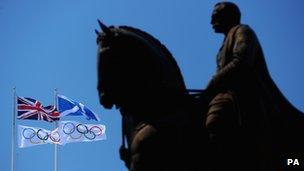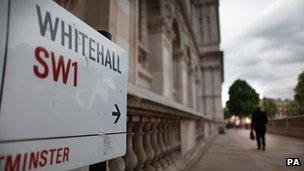London 2012: What exactly is a Cobra meeting?
- Published

Olympic security meetings are set to become routine over the next three weeks
It sounds like a venomous snake.
Or the beer you might have to wash down a chicken vindaloo.
In other words, it sounds powerful. Even sinister.
Cobra meetings, or Cobr meetings as they are often also called, are named after Cabinet Office Briefing Room A on Whitehall.
It is an emergency response committee, a get together of ministers, civil servants, the police, intelligence officers and others appropriate to whatever they are looking into.
When the government announces that it has convened a Cobra meeting, it can give one of two impressions.
The first is it is quickly getting to grips with a thorny issue of immediate national significance. The other is that something bad is happening and maybe they are to blame.
Use of language
So those in government are very careful in their use of language. Sometimes it is useful for them to sound reassuring. Sometimes, conscious of the potential for a mass outbreak of media hype, it is more useful for them to talk down the significance of such a meeting.
The build up to the Olympics is a case in point. With just a few days to go until the opening ceremony, the prime minister chaired a meeting on Monday involving senior ministers, Olympic organisers and those responsible for security.
Keeping the Games safe, making sure transport works as well as can be expected and dealing with the threat of strikes were the main themes up for discussion, we were told.
It was described, by many, as a Cobra meeting. One of many that will happen before and during the Olympic Games.
But, Downing Street sources insisted, it wasn't a Cobra meeting. Clearly if it looks like a Cobra and it sounds like a Cobra, it doesn't necessarily mean it is a Cobra.
'World War Three'

Cobra meetings bring politicians, the police and security services together
Cobra meetings were first convened in the 1970s.
"It was also the war room, the decision taking forum for transition to world war three," Peter Hennessy, Professor of Contemporary British History at Queen Mary, University of London, has said.
But what was set up for handling the first miners strike in 1972 or even the potential outbreak of war, was found to be inadequate by the end of the century, according to Peter Riddell, the Director of the Institute for Government.
"The shortcomings of the 1970s' system were exposed in 2000 and 2001: first by the fuel protests in September 2000, second by the foot and mouth outbreak the following spring, and third by the 9/11 attacks," he wrote, in a recent article for the Political Studies Association.
This led to a change in the law.
The 2004 Civil Contingencies Act means there are, in theory, better plans in place to deal with an emergency and, says Peter Riddell, a new legal framework and powers to "enable authorities to deploy armed services, ban public assembly, improve travel restrictions, and to prevent public access to sensitive areas".
Since then, references to Cobra have cropped up more frequently.
Take the eighteen months. Cobra has met to discuss the airstrikes on Libya and the evacuation of Britons, last summer's riots and the threat of fuel shortages in March. And that is not an exhaustive list.
But to get a sense of the subtlety required in deciding whether to describe a meeting as a Cobra meeting, take two remarks from two now retired cabinet secretaries.
'Rather mundane'
In their time, both Lord O'Donnell and Lord Turnbull were the most senior civil servants in the country.
"It sounds great but it stands for cabinet office briefing rooms, so it's rather mundane," reflects Lord O'Donnell.
"There are accusations it is a bit of a 'look at me jumping' kind of response," adds Lord Turnbull.
"But it is a way of ensuring you have got security, intelligence, police, emergency services, whoever you need for the nature of the crisis itself, brought together in one place and communicating very rapidly with one another."
Sometimes it is useful for a government to give an impression of jumping. Sometimes it is not.
Whilst the get-togethers in Whitehall about the Olympics are routine and in the diary, as opposed to hastily assembled in response to a particular incident, expect those in government to tell us yes, it is a meeting, but no, it is not a Cobra.